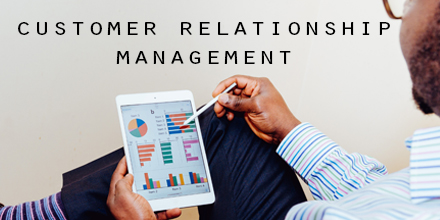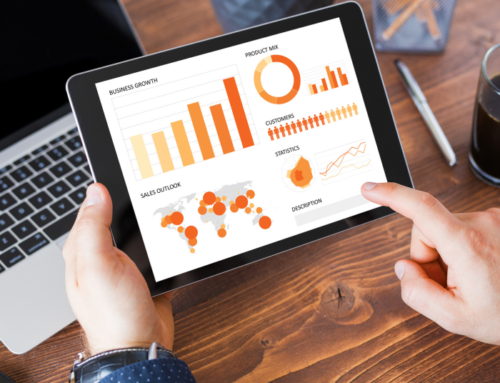What is CRM Software in bangalore?
Customer relationship management (CRM) is a tool for managing all of your company’s customer and potential customer relationships and interactions. The objective is straightforward: to improve commercial relationships. A customer relationship management (CRM) helps organisations keep in touch with customers, streamline procedures, and boost earnings.
When people speak about CRM, they usually mean a CRM system, which is a tool that aids in the CRM systems, sales and marketing, productivity, and other tasks. A CRM solution enables you to focus on your company’s partnerships with individual people such as consumers, care recipients, colleagues, or suppliers throughout the relationship’s lifecycle, which includes finding potential subscribers, winning their business, and offering assistance and additional services.
A CRM replaces the jumble of spreadsheets, databases, and apps that many firms use to keep track of customer information. As a result, there was more organisation, efficiency, and better time management, as well as satisfied clients. Client management solutions, such as CRMs, bring together all of your marketing leads and customers’ information in one location. Each lead and client’s communications (form fills, phone conversations, mails, messages, and meetings), files, quotations, purchases, and tasks are consolidated in a CRM. Your entire team has access to those details at the correct time–whether it’s to close a deal or provide exceptional service.
For growing businesses, a CRM streamlines sales, marketing, customer support, accounting, and management. The information concerning a client’s customer journey can be accessed and edited by multiple parties.
A customer may first join your CRM by providing contact information or completing a demo form online. You can update the customer’s information after a few join emails with a sales rep to reflect what you’ve learned about their company. After that, marketing may swiftly figure out how to best appeal to their customers’ demands. Some of these processes are recorded automatically, while others require manual input. Having everything in one place minimises unneeded paperwork and clutter, enhances communication, and boosts customer satisfaction.
Why do companies use CRM?
Customer relationship management is used by businesses for a variety of reasons, but the end goal is to improve customer satisfaction and increase sales.
A CRM is best used for thought-out purchases or network operators in general. A solid CRM can help fine jewelers, gardeners, real estate agencies, lawyers, and accountants. B2B businesses, particularly those with extended sales cycles, such as SaaS, benefit from a system that streamlines operations. Consider the difficulties that a CRM tries to answer when determining if your firm will benefit from one:
- All of the information about your customers should be kept in one place. You can use a CRM platform to give everyone a single, up-to-date source of information instead of sending information to different departments.
- It’s simple to maintain track of earlier encounters with a CRM if clients often contact multiple personnel from your firm.
- Your sales teams’ productivity can be tracked using a CRM. It can also aid in the creation of a workflow or process.
If you’re reasonably convinced your company needs a CRM but are still researching the options, knowing the differences among the three types of CRM systems is crucial. PWhile there is some overlap between both the three CRM categories, each one focuses on certain roles and capabilities.
Types of CRM
While all of those advantages apply to almost any CRM on some level, customer relationship management encompasses a wide range of CS, marketing, and sales technologies. CRM products differ in terms of functionality and purpose, and they can be classified into three groups.
- Collaborative CRM systems
One of the main goals of collaborative CRM systems is to break down silos. The marketing team, salespeople, and customer service reps often work in separate departments that make the company look disorganised. Each of those divisions is further divided in larger organisations based on variables such as geographical areas, channels they service, items they specialise in, or skill specialisations. However, in order to create a consistent user experience throughout the consumer journey, you’ll need a mechanism to transmit information in real time across the entire organisation.
No matter which division or channel they work in, collaborative CRMs ensure that all employees have exposure to the same up-to-date customer data. Not only does customer service have access to all of the data gathered by marketing and sales teams when engaging with a prospective customer, but call centre operators also have access to updated data on customer contact that occurred via email.Because of this link between departments and channels, customers escape the inconvenient feeling of repeating themselves every time they communicate with a new contact.
- CRM systems in operation
Operational CRMs simplify a company’s customer relationship management processes. They give you the tools you need to better visualise and manage the entire client experience, even if it has a lot of them. This begins with their first contacts with your company’s website, continues through the entire lead project management as they progress through the sales funnel, and culminates in their behaviours once they’ve become a client.
Typical automation elements are found in operational CRM systems. Marketing automation, selling automation, and products and services relieve your staff of some of the tasks they would otherwise be responsible for. This frees up time for them to focus on the more innovative and personal components of their jobs,the stuff that requires human interaction.
- CRM systems with analytic capabilities
Analytical CRMs are made to help you look at your customer data in order to learn something useful. Digital technologies and platforms have made it easier than ever to gather huge amounts of data. However, data analysis the process of transforming that data it into something usable for your business is a difficult task. Estimates show that more than half of the data that businesses gather is never used.
It’d be a waste for your customers’ information if you did that. An analytical CRM includes tools that enable you to use the data you now have to discover patterns in your customers’ behaviour. You can best explain what actions lead to the most successful sales using this information.
- CRM systems with a strategy
Strategic CRM is a form of customer relationship management in which the company prioritises the needs of its customers. It gathers, categorises, and utilises data on customers and business trends in order to provide a superior value proposition for them.
Customers’ input is vital to the company’s sustainability. In contrast to Content CRM (where the company assumes customer requirements and concentrates on building the product, which can lead to over-engineering), here the company is always learning about and responding to consumer expectations.
Considerations for Purchasing CRM Software
When choosing CRM software, a company should consider the following factors:
- Processes and business strategy
It aids in the automation of a customer relationship management approach. As a result, before choosing CRM software, a company should be clear about its goals and operations.
- Needs of the business
CRM systems range from domain-specific solutions that address a specific problem, such as salesforce, email marketing, services automation, company engagement, and so on, to comprehensive enterprise management solutions.
- The clientele
The number of customers that a company must service.
- Expenses
Prior to choosing a vendor, a company must set a budget. The amount of money set aside for CRM is determined by how much customization is needed.
- The surrounding circumstances
Which CRM a company should use depends on its operating environment, such as B2B or B2C.
- Channels of distribution
Direct selling, channel sales via intermediaries, and online selling to customers through retail are all examples of a company’s sales channels. They are important factors to consider when choosing the best CRM software.
- Integration of systems
All of the features that the company requires and that the CRM supplier can give without requiring extensive customization.
- Partners’ abilities
The partnership has to be able to provide detailed support to a business or assist in the successful implementation of the CRM.
CRM’s Operation
CRMs collect data from email, voice conversations, and other sources to help you acquire new customers and retain existing ones. They consolidate your processes and business processes into a single location, allowing you to collaborate, close sales, and get more done.
The bread and butter aspects of a CRM system are advertising and sales team automation, relationship and project management.CRM should, in practise, work with the way your company operates. There are many different types of decent CRM available, and there is no such thing as a one-size-fits-all/right CRM solution. There is, however, CRM technology that is suited to each company’s specific business strategy.
CRM systems are primarily intended to improve customer engagement, the selling process, and the execution of marketing initiatives. They accomplish this through streamlining process and the sales pipeline, automating tasks, and analysing data.
A good CRM strategy will give you a one-stop shop for managing your team’s phone, chat, and email interactions. They keep track of leads, customer wants, offers, and results in one location and assist with website optimization and ad campaign management.
Why is CRM important ?
A business’s customer base is one of, if not the, most valuable asset it has.As a consequence, this asset need rigorous management and control, as well since the usage of a customer relationship management system (CRM), as monitoring and maintaining current and potential client relationships becomes increasingly challenging as businesses develop. For instance, you might ask yourself this question at some time throughout the development of your company.
You might notice that your consumers and prospects are drifting away, unsatisfied with just a rising service or product. They want to be engaged, and they expect a company to treat them with respect and provide a personalised experience that helps them feel valued.
You can assure long-term customer connections by understanding each detail about your consumers, including their wants, preferences, and habits, at all times with CRM software.
Features of CRM :
- Management of Contacts
Contact management, which is also known as customer management software, is an important part of CRM. It lets users organise their contacts into groups so they can keep track of them and better serve them. You’ll be able to gather critical customer information and enhance your marketing approach while releasing new products with this CRM function.It also personalises every client interactions, making them feel valued and cared for. This is a critical component of customer happiness.
- Customer Opportunity Management and the Sales Force
One of the most basic things about CRM is that it lets you figure out how many chances your sales team has with clients. Lead scoring is a way to find out which customers are most likely to become customers.This helps to streamline sales and marketing teams while also increasing productivity and optimising the sales process.
- Identifying High-Quality Leads Through Lead Management
Having a CRM platform to handle leads is a necessary. Based on a company’s demographics and psychographics, this technology may identify the ideal customers to pursue. Additionally, it aids your sales staff by helping them concentrate on the most promising customers at each stage of the sales process.
- Customer Satisfaction-
Customer loyalty refers to a customer’s willingness to do business with a specific supplier and purchase products on a frequent basis. This is typically evident when a customer is extremely satisfied with a supplier and returns to the organisation for business negotiations, or when a customer is steered toward re-purchasing a specific product or brand by that provider over time. Client happiness is the most crucial aspect a firm should focus on in order to maintain customer loyalty. As a result, client loyalty is a determining factor in CRM and is always important for corporate success.
- Client Complaints
Dealing with customer complaints has always been a difficulty for providers.Most of the time, filing a complaint means that a customer is unhappy. There are many different reasons why a customer might file a complaint. There may be a real reason why the customer is unhappy, but sometimes complaints are filed because of a misunderstanding of the terms of the supplier’s agreement about a product or service. Handling these issues to the customer’s ultimate satisfaction is critical for any organisation, so it’s critical for them to have an established set of processes in CRM to handle these issues and efficiently resolve them in a timely manner.
- Dashboards and reports
Some of the most popular CRM functions used to be exclusive to business intelligence tools, including as reporting, dashboards and BI. Statistics may be presented in a more interesting and visually appealing manner with the help of customised reports and presentations. A system that is easily available through various portals and offers genuine data improvements is provided, making it simpler for different types of users to access. It is possible that these reports may aid management in making data-driven choices concerning CRM investments. Your company’s future success depends on the use of business intelligence.
- Information on Sales
CRM’s ability to organise sales and service data into consumable bits is one of its strongest advantages. After raw data has been stratified, it may be turned into the visuals you need to make choices. KPIs may be quantified, pain spots identified, and data-driven decisions can be made by users.
- Management of Sales Performance
Sales performance management, among other CRM system features, offers sales teams a variety of benefits. Managers can immediately see which aspects of the sales department are doing well and which need improvement. Data can be put in order with the help of sales reps or other quantifiers. You can track the performance of your sales partners from the platform to make sure that your team is doing its best.Identifying problem areas with detailed data might help you deal with them more effectively.
- Forecasting sales
By comparing actual results with forecasts, this method yields far more accurate sales benchmarks. For example, you may observe whether your sales team is on track and utilise this knowledge to improve your future efforts by using the data you collect. Data and patterns from the past and present may be utilised to predict future revenue and sales. If you need to produce forecasts for years ahead of time or even suggest new geographical areas, this is a must-have function. This is a fantastic method to make your data work harder for you, allowing you to make considerably more educated business decisions.
Benefits of CRM :
- Customer service that is better
Despite the fact that today’s CRM software has many functions, it was created to facilitate business-to-business contacts, and this remains its core purpose. A customer relationship management system (CRM) organises all of your customer interactions and collects key customer data like demographics, purchase history, and previous discussions across all channels, making it conveniently accessible to everyone in your organisation who needs it. This guarantees that your staff have access to all they need to know about the consumer and can give a better customer satisfaction, which increases customer happiness.
- Customer retention has improved.
After you get leads and turn them into customers, you’ll have to work hard to keep them as customers and build customer loyalty. High customer mobility may have a lot of negative effects for your business, such as reduced revenue or cash flow disruption, so use the CRM and the information it provides about your customers to promote repeat business. The CRM has features like automated tickets, customer service automation, and tracking user behaviour that can help you find problems and solve them quickly with your customers.
- Sales have grown.
A CRM platform may help you automate key procedures, enhance your sales process, and analyse all of your sales data in one place, resulting in increased sales and efficiency. A CRM allows you to create a step-by-step sales procedure that your staff can count on and that you can readily change as problems emerge.
- Analytical Reports
One thing is to amass a wealth of customer data; quite another is to know what to do with it and how to make the most of it. CRM software often has built-in analytic tools to contextualise data and break that down into actionable and KPIs that are easy to understand. Metrics like rates and demographic data help you assess the success of a promotional campaign and make adjustments as necessary.
- Information centralised database
Another advantage of CRM software is that it generates a centralised database with all of your customers’ information, making it easily accessible to anybody in your organisation who needs it. This allows a sales representative to quickly learn, for example, what goods a specific customer is interested in. Data from prior interactions with a client is maintained in the CRM and may be utilised to improve marketing and sales efforts in the future.This saves your employees time searching over old files and records, as well as providing a better and more productive customer experience.
- Sales reports that are automatically generated
The CRM software’s dashboard and reporting capabilities make it simple for your team to collect and organise data about potential and present clients, allowing staff to automate or manage their workflows and procedures. Your team members can also use the CRM to evaluate their performance, manage their quotas and goals, and see how far each of their projects has progressed at a glance.
- Internal communication that is more efficient
A CRM can make it much easier for your staff to connect with one other, in addition to improving communication between your company and your consumers. A CRM makes it simple to examine how other employees interact with a potential consumer, allowing your team to keep a consistent brand voice.
Disadvantages of CRM
- Costly:
A CRM system will cost the company a large amount of money to install. CRM software is excessively costly, since it is available in a range of pricing packages depending on company needs. It enhances total company costs and may not be suitable for small businesses.
- Training:
The successful operation of CRM necessitates the employment of individuals who are knowledgeable and well-trained. Training employees in a CRM system may be expensive and time-consuming. In order to completely comprehend CRM software, they must study and acquire knowledge about it. All of this is quite expensive and requires a lot of effort on the side of the organisation.
No human engagement is necessary with CRM since it is a perfect machine on its own. Automated CRM software gathers and analyses all of the relevant data. The relationship between a company and its customers can be better managed if customers and employees can talk to each other directly. Customers might go elsewhere if they can’t talk to a person, which would mean fewer sales and less money.
- Security Concerns:
Another significant disadvantage of CRM is the lack of security in the data collected and retained. All the information collected is kept in one place, which makes it easy for it to be lost or hacked. Employees may enter wrong information or change numbers, which can lead to bad planning.




